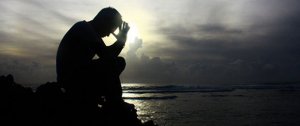How do we know that God doesn’t “cause” our suffering?
How do we know that the theology discussed in yesterday’s devotion is actually “solid” and that God is not the distributor of both good and bad?
 Unfortunately the answer is not very simple . . . nor is it black and white.
Unfortunately the answer is not very simple . . . nor is it black and white.
Let’s take a look at Genesis where we have an account of our creation story . . .
“When God began to create[a] the heavens and the earth— 2 the earth was without shape or form, it was dark over the deep sea, and God’s wind swept over the waters— 3 God said, “Let there be light.” And so light appeared. 4 God saw how good the light was. God separated the light from the darkness. 5 God named the light Day and the darkness Night.”
Genesis goes on to walk through the entire creation story, leading up to the creation of “Adam and Eve” – “Adam” meaning “humankind.” (Not one literal man and one woman)
But check out what Genesis says later in the chapter, after all the “days” were created . . .
27” God created humanity in God’s own image,
in the divine image God created them,[b]
male and female God created them.
28 God blessed them and said to them, “Be fertile and multiply; fill the earth and master it. Take charge of the fish of the sea, the birds in the sky, and everything crawling on the ground.”
Other translations read, “So God created humankind[e] in his image,
in the image of God he created them;[f]
male and female he created them.
28 God blessed them, and God said to them, “Be fruitful and multiply, and fill the earth and subdue it; and have dominion over the fish of the sea and over the birds of the air and over every living thing that moves upon the earth.”
In Hebrew the word “dominion” means “rule over,” or in modern day language – it would be akin to the word “power.”
This passage indicates that while God created the universe and that which is contained within it, God has put US in charge here. We have dominion. In the ultimate sense, God is in control but in an immediate sense, we human beings are in control and have “dominion” or “rule” over what happens here.
- We have dominion to:
- love one another . . . or not
- to be in relationship with one another and bring about good in the world . . . or not
- influence one another – in both good and bad ways. We can seek God during these times of influence, but God does not force God’s self on us.
We have power . . . which sets the world into a course of action that has results upon results, interactions that are dependent on one another . . . basically the butterfly effect.
Therefore, it is ok – when we find ourselves in the darkest of places to cry out to God against our circumstances. We are not insulting God during these times, but instead calling on that Divine power, love, and peace to cover us so that we can make it through the difficult times.
Even Jesus cried out in his difficult time . . .
36 Then Jesus went with them to a place called Gethsemane; and he said to his disciples, “Sit here while I go over there and pray.” 37 He took with him Peter and the two sons of Zebedee, and began to be grieved and agitated. 38 Then he said to them, “I am deeply grieved, even to death; remain here, and stay awake with me.” 39 And going a little farther, he threw himself on the ground and prayed, “My Father, if it is possible, let this cup pass from me; yet not what I want but what you want.”
Thoughts to Ponder:
- Do you believe God singles us out to endure pain and loss?
- Do you see some randomness in how and where evil strikes?
- How can our own “sin” (missing the mark in our own lives) cause suffering for both others and ourselves? (Think global climate change)
